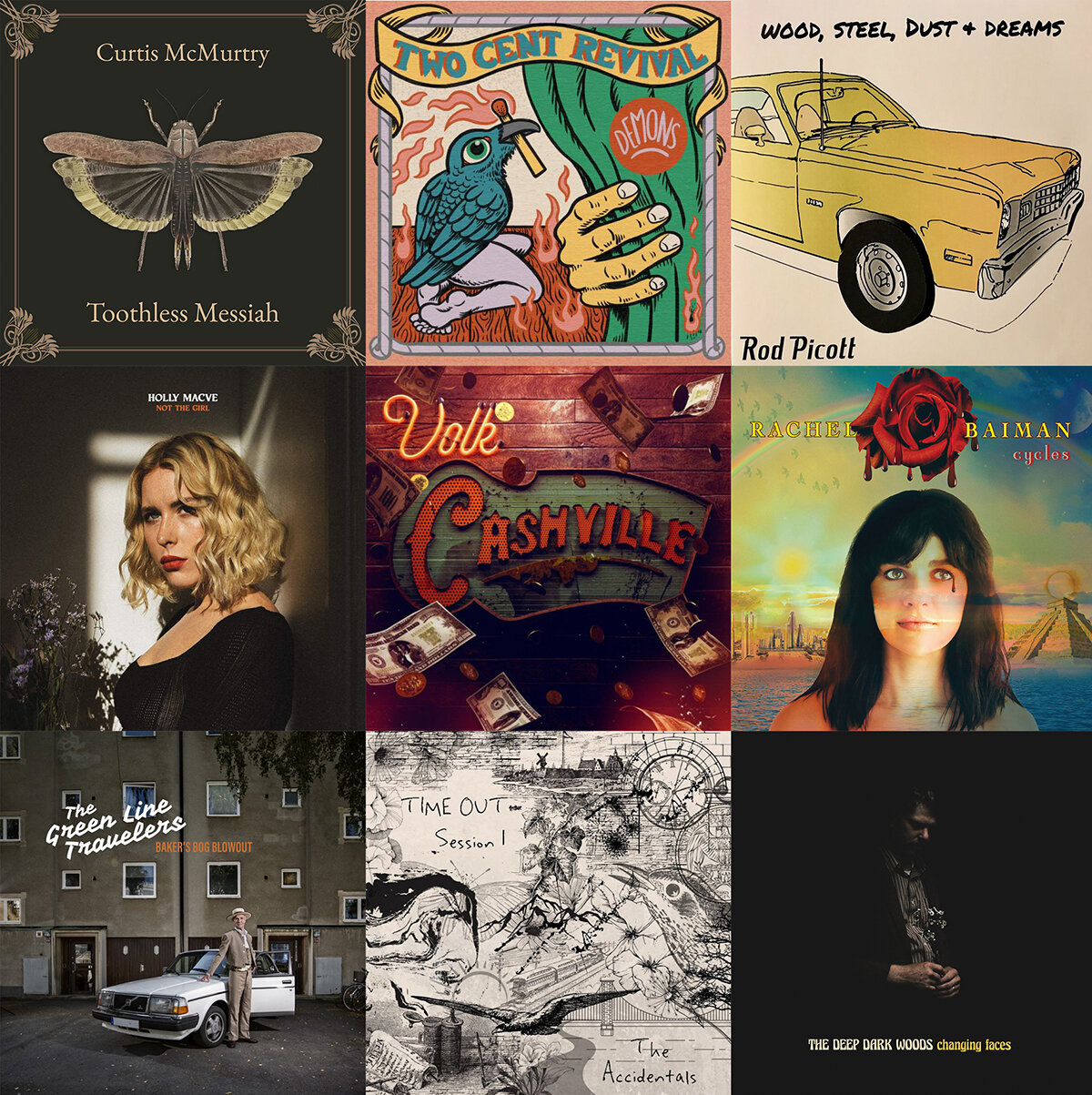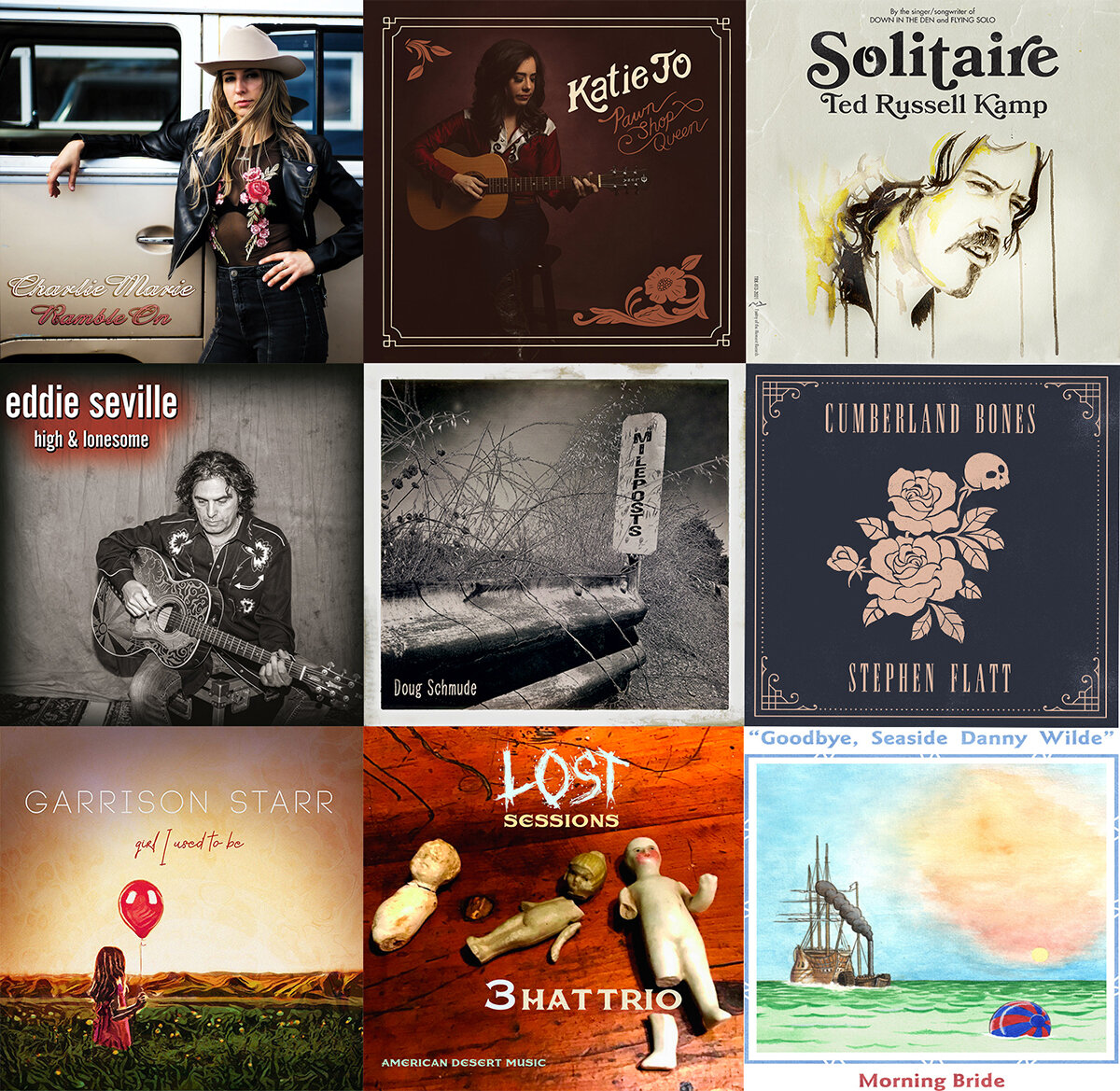Dave Richardson Palms to Pines Self Release
Massachusetts singer-songwriter Dave Richardson’s last album CARRY ME ALONG was among my favourites of 2018, so I received this latest one with some trepidation. I am relieved and happy to report that this recording does not disappoint and that the songs have already become akin to ‘old friends’.
On the folkier side of Lonesome Highway’s roster of album reviews, Richardson hangs out along with the Club Passim crowd based in Boston, Massachusetts. The title track sets the scene for the album’s themes - no matter how appealing the grass on the other side (in this case, a trip from the colder east coast to the alluring sunny California) home is always best.
Nature is referenced throughout this enchanting collection, from the joys of sitting alone in his Garden House, comparing his love to the sweetness of maple syrup in Honey Leaf (de rigeur for all New Englanders after all!) and the cycle of life being reflected in planting and growing in And Maybe. Once again, Richardson chooses Dan Cardinal (Darlingside, Lula Wiles, Tony Trishka) to coproduce and the result is a beautifully sparse and simple sound that favours the lyrics and subject matter. Richardson’s vocals and expert fingerpicking acoustic guitar skills are complemented by the ‘barely there’ percussion of Ariel Bernstein once again, the acoustic bass playing of Grace Ward and the exquisite cello playing of Valerie Thompson. The final piece of the completed work is the addition of backing vocals from Lauren Balthrop and Emily Moran, who both contributed their vocal parts remotely.
Highlights include Keep Trying, wherein Richardson goes a long way towards explaining to this decidedly extrovert reviewer what it feels like to be an introvert: ‘Sometimes you’ll find me sitting alone, close to the action, watching it happen … but I’m always glad I came, and I’m gonna try harder’. Apology To Mouse (Recently Deceased) is reminiscent of his ode to a dead giant squid from the last album, although in this case, there is somewhat less sympathy forthcoming for the unfortunate rodent who picked the wrong home to invade. The touching My Friends is a simple vocals and guitar tribute to, and a celebration of, his musician compadres - ‘We will sing until the embers burn out’. Long may that fire burn.
Review by Eilís Boland
The Flatlanders Treasure Of Love Rack ‘Em Records
Yet another recording that would not have seen the light of day were it not for the pandemic, the bones of TREASURE OF LOVE came about nearly ten years ago when the threesome recorded songs at Joe Ely’s Spur Studios in Austin. Ely and his Flatlander colleagues Jimmy Dale Gilmore and Butch Hancock, had been at that studio recording songs for other projects and in their spare time put down the basics that make up the tracks on this album. Those tracks included self-written material that featured regularly in their live shows, some favourite cover songs and a few new songs. With time on their hands last year, they decided to flesh out those recordings and finalise the album.
Very much at the forefront of the Texas 1970’s music scene, the three carved out successful solo careers, while also setting the time aside to record and tour as The Flatlanders. Inspired by the writing of Townes Van Zandt (they nicknamed him The Patron Saint of The Flatlanders), the album includes a remake of Zandt’s Snowin’ On Raton, a song that features regularly at their live shws. Other well-chosen covers that impress include Give My Love To Rose, with Hancock’s vocal sounding every bit as convincing as the original from Johnny Cash. Ely is given the lead vocal honours on the Hancock - written Ramblin’ Man and Gilmore leads out on the Everly Brothers’ Long Time Gone. Elsewhere, Leon Russell’s She Smiles Like A River gets a country makeover and The Ballad Of Honest Sam is dispatched with as much vocal twang as Paul Siebel’s original.
They called on Lloyd Maines to assist with the production alongside Joe Ely’s wife, Sharon. The end result is a fine collection of songs that lives and breathes all that is to love about the trio. It’s an album to savour in one listen, from the ripping Butch Hancock written opener Moanin’ of the Midnight Train to the country blues of Sitting On Top Of The World, which brings this splendid album to a fitting conclusion.
It’s no surprise that these three high school friends are honoured by a plaque on Lubbock’s West Texas Walk of Fame alongside legends Waylon Jennings, Buddy Holly and Roy Orbison and this album is a reminder of their collective talents. Hard edged Americana with a capital A and presented by a collection of players that sound as if they’re having the time of their lives in the studio, TREASURE OF LOVE is an essential purchase for any discerning lover of roots music.
Review by Declan Culliton
Lara Hope & The Ark-Tones Here To Tell The Tale Sower Records
On first listen to this album, it’s no surprise to learn that Lara Hope won the Ameripolitan Music Award for Best Female Rockabilly Artist in 2017. Not strictly a rockabilly band only, Lara Hope & The Ark -Tones’ HERE TO TELL THE TALE finds them equally at home churning out country rockers, pop infused blues and melodic ballads, as they are filling dance floors with snappy rock and roll tunes.
Hope’s apprenticeship found her playing in punk bands, prior heading down the rockabilly road with Lara Hope & The Champtones, who morphed into the current band in 2012. That line up finds Lara on vocals and rhythm guitar, Eddie Rio on lead guitar, Matt Goldpaugh on bass and Jeremy Boniello on drums. Studio guests on this album include Hayden Cummings (sax), Rosio Rion Porco (fiddle and cello) and Bobcat Arkham (baritone guitar).
Two albums followed : 2014’s LUCK MAKER and 2017’s LOVE YOU TO LIFE, both very much reflecting their high energy rock and roll live shows. Although the latest recording finds them somewhat broadening their horizons with eleven original songs built around Hope’s impressive vocals, it never abandons their full-on rockabilly tone. They’re out of the starter blocks at pace with the full on twanger Let’s Go, which is matched with the equally steamy Some Advice. Likewise, the jaunty Stop, Drop and Roll is a dance floor filler, before they draw breath with the more relaxed It’s A Crime and the jazzy The Art Of Asking, both evidence of their resourcefulness outside their traditional musical comfort zone.
A scorching stockpile of rockabilly, Western Swing and rock ‘n’ roll, HERE TO TELL THE TALE does justice to a combo that manages to recreate their live sound on this very enjoyable, and very danceable album.
Review by Declan Culliton
Rodney Crowell Triage Thirty Tigers
Although conceived during a period of political, social and environmental upheaval, TRIAGE, the latest album from Rodney Crowell, circumvents the anger and exasperation that have fuelled many albums from his contemporaries in recent times. Had a younger Crowell sat down with pen and paper to create this album, the result would no doubt have been somewhat different, most likely finding him spitting fire. The passing years have progressively found his writing more controlled, with the cogent messages in his songs well-reasoned without ever being preachy.
Recent recordings have found the Texan to be in a particularly reflective frame of mind and this album continues on that path and is probably his most personal to date. Looking for answers to the topsy turvy times we live in, the album deals the listener a chapter of songs whose themes consistently address love and restoration.
While many of the songs had been completed pre-pandemic, the enforced quarantine found Crowell re-writing a number of them alongside penning the remainder in isolation. He also re-entered the studio, masked up, to re-record the vocals on many of the songs.
As you would expect, the musicianship is top drawer. Pre-pandemic, Crowell had been joined in the studio by a host of musical friends, under the watchful eye of producer Dan Kobler. Among them were Steuart Smith (guitar), Larry Klein (bass), John Jarvis (piano) and Jerry Roe (drums). Eamon Mc Loughlin and David Henry added strings and harmony vocals came from Ruth Moody, John Paul White and Tanya Hancheroff. Other contributors engaged remotely later, including John Leventhal and Greg Morrow.
The opening line from the title track ‘I think I know what love is’ addresses the theme of universal love, which is a recurring topic in each and every song on the album. ‘The girl on the street was once someone’s daughter’ he later reminds us on the tale of the out of luck addict he encountered begging in San Francisco on the Girl On The Street. After a one-minute semi-spoken confessional intro, the opening track Don’t Leave Me Now bursts into life. It’s a heartfelt admission of a past indiscretion and a plea for forgiveness. Transient Global Amnesia Blues was hastily written following a temporary loss of memory for Crowell which led to a short-term hospitalisation. It’s expressed in spoken lyrics, inspired by the frightening health scare and the relief brought on by his recovery. A beautifully crafted song, it recalls the late David Olney’s epic Jerusalem Tomorrow. The simple country ballad One Little Bird is bursting with melody and is fuelled by memories of good and bad times and thoughts of mortality. The most politically charged track is Something Has To Change, a song written some years ago by Crowell but one that was left in the slow cooker. Ironically, the sentiment expressed still remains relevant. Adding no little dynamism to the song are some unexpected killer saxophone bursts.
He closes the album with the self-portrait and hymn like This Body Isn’t All There Is To Who I Am. It’s a positive note to finish with and a reminder that redemption and liberation are never unattainable. It’s also a statement by Crowell of his current state of mind and a fitting album closer.
Review by Declan Culliton
Bill and the Belles Happy Again Ditty Boom
With a sound that recalls the vocal harmonies of The Ronettes, the country swing of The Hot Club of Cowtown and the retro vaudeville of Manhattan Transfer, Bill and the Belles comprises founder Kris Truelsen on guitar, Andrew Small on bass, Helena Hunt on banjo and Kalia Yeagle on fiddle.
Produced by Teddy Thompson, the eleven track HAPPY AGAIN fuses old time country and Western Swing with a bit of Motown on the side. It’s also very much a divorce album, with all songs composed by Truelsen following his marriage breakdown. (“One of the darkest times of my life turned out to be one of the most creative,” he notes “I realised, ‘‘My life is chaos. I need to write about this shit.’’). Despite the subject matter, the songs are more often than not laced with humour and innuendo. They also offer a timeless free and easy style, sounding like an album you discovered in your elderly aunt’s attic.
You are left in no doubt about Truelsen’s drift from the word go with the opener Happy Again (I’ll Never Be). Crisp lead vocals, doo wop harmonies and plucked banjo unite on the tale of lost love and woe. On a similar vein Blue So Blue laments unrequited love with weeping fiddle and brisk upright bass. They raise the tempo on the toe -tappers Taking Back My Yesterday and The Corn Shuckin’ Song before bookending the album with the mournful Good Friends Are Hard To Find.
Notwithstanding the unfortunate circumstances that triggered the album, it gifts the listener a breezy summer sound that would hit the spot in any season.
Review by Declan Culliton
Johanna Samuels Excelsior! Basin Rock
This is an interesting debut release from Los Angeles artist, Johanna Samuels, who delivers songs that are laced with cryptic lyrics and soft, dreamy arrangements that lull the listener into a sense of easy reverie. Her band consists of Harrison Whitford on guitars, Garret Lang on bass and Sean Mullins on drums and they deliver as a unit on all fronts throughout.
Having your songs open to interpretation is perfectly fine of course, and we can all take what we hear from the words. Sonny seems to be about a failed relationship with tell-tale lines like ‘I want to be alone, More than I want to be alone with you.’ Looking back at someone who was caught up in different priorities; ‘I did not think about you, I thought about loyalty; It means make money and fuck the rest. Every now and again, I get a heavy feeling in my chest’
Nature’s Way has such a sweet melody but hides the meaning of the song that deals with being put down and taken for granted, ‘Most people say it's nature's way, That I give and that you take. What will it be, My Love, today? It's getting hard for me to say.’ High Tide For One is concerned with a relationship breakdown and feeling frustrated by the lack of communication, ‘And I don't wanna talk to you, Even if you get time to, I just don't need more work to do, It's no help being sorry.’
All Is Fine picks up the tempo and breaks into a sweet melody with some great keyboard parts from Samuels. The lyric speaks of moving on and not having to share space with the same person anymore, ‘All is fine, Sometimes I even keep what's mine so, Take your time, I'm already gone.’ The Middle has some nice pedal steel and keyboard sounds as things return to a slow pace and a drift across more relationship musings where the individuals don’t want to work out their problems, ‘And you said you didn't want me near.’
Similarly, Close To the Vest, is centred around keeping guard of emotions and not being too open with laying yourself bare, ‘And I thank you for reminding me to, Play close to the vest.’ Song For Sid is about the struggles of a friendship with a fellow musician and the lines, ‘Oh all the things that we take, Say you love me like the money you make,’ tell their own story.
Julie is another slow melody around a toxic relationship where, ‘You're breaking me, Julie, I do the best that I can; But you always find something, That you must reprimand.’ Again, in the song, Less Of You, we are treated to the musing that ‘And I rarely think about you, And when I do, I couldn't think less of you.’ Also, the focus of divisive pride comes to the surface with, ‘Since you're always thinking of you - I don't have to.’ So, some great written lines interspersed between the catchy melodies and the fine music that is created.
The last song, Cathy, is just Samuels and her piano, a beautifully judged performance and the regret of leaving precious feelings behind, ‘It's so funny how the days will just pass by, How I can heal enough to love, And something gorgeous had to die.’
Ultimately, this is an album laced with emotions, of moving on and growing up. From youthful dreaming and wishing for certain outcomes; all the way through to the grim reality of actual experience. The world gets cold and not everybody processes the need to keep reaching out instead of deciding to retreat and hide away. I sense that these are very personal songs to Samuels and her strong musicality is certainly very evident throughout these thirty-six minutes of soothing melodies.
Samuels called upon a number of female friends to add vocal harmonies and address the gender balance. When you can reach out to Courtney Marie Andrews (two tracks), Hannah Read (two tracks), Olivia Kaplan (two tracks), AO Gerber (four tracks), Hannah Cohen and Louise Florence (one track), then the life lessons learned through these tracks seem a little easier to reflect upon. This album leaves you feeling that there is so much more to follow from this talented artist.
Review by Paul McGee
Melody Duncan Wolf Song Self Release
This is a debut album from multi-instrumentalist, Melody Duncan, an artist who comes from a musical family and who has written, performed, recorded, and produced this entire project from her home base in Atlanta, Georgia. Quite an impressive achievement and displaying a quiet confidence in her abilities to deliver work of substance. Melody did call upon the talents of Josh Reynolds (Little Big Town) for the mastering process, but apart from this we are given a completely formed DIY package.
Prelude opens the album with layered vocals, raised in sweet harmony, offering such an inviting welcome. The title track, Wolf Song, follows and examines the excitement and fear that accompanies change and embracing risk. Duncan has an interesting vocal inflection to complement her excellent skills on a number of instruments. She has a rich tone in her delivery and there is a hint of a Patty Griffin influence in the singing style. However, comparison is lazy and the thief of joy, so let’s just move along.
Cardinal uses the species of bird as a metaphor in looking at a relationship ‘You may have sung your song, But if you think you’re keeping me, I don’t fly the way the wind blows, There’s other ways to be free.’ Some impressive whistling also on this track by Melody.
Dear Friend asks why we feel the urge to be continually questioning and searching for answers, while Lonely deals with a sense of isolation and depressive thoughts, ‘Such a matter of the head that really messes with my heart.’ Again, there is whistling, as an added touch, this time lending an almost-Morricone tone to proceedings.
Reunion is a song about past problems, getting sober, learning how to accept who you are and reach out for love and connection. Edward, is a song that has an interesting jazz-like arrangement but is obscure lyrically and just don’t seem to land properly. There are others that carry superbly arranged melodies, like Paper and Campfire, and there is no doubting the talent of Melody Duncan on this debut project and I see a future that is bright.
The final track, Rain Storm, is a field recording, or sound effects, of rain - running for almost five minutes. It’s not the best choice to end an album, leaving an unfinished sense to the record. It just seems like a missed opportunity to finish on a stronger note.
Review by Paul McGee
Steven John Birks Along The Tracks Self Release
Contemporary singer-songwriter Steven John Birks delivers ten songs with an earthy vocal delivery and impressive harmonica playing on his second release. It follows his 2018 debut, Long Time Comin’ Round and there is a similar Folk/Roots feel throughout the entire project, which was written, recorded, mixed and mastered by Birks himself. If that was not impressive enough, he also plays all the instruments, which include acoustic guitar, harmonica, percussion and tambourine.
There is an appealing acoustic blues sound on the title track that opens the album and on songs like, I Will Rise and When the Whistle Blows, the topic of war is highlighted and the struggle, not only to survive the fighting and the trauma, but to also endure.
Dreamcatcher sings about the power of dreams and the potential to spark our imaginations to conjure up positive changes. Ship Of Fools looks at the way in which we are all caught up in our routines, habits and impulses. Is it our destiny to simply repeat the mistakes of the past?
There and Back Again is about the nine-to-five drudgery of work and the self-imposed prisons we make. The story song, The Curse Of Matilda, is a tale of abuse between master and servant, unwanted pregnancy and a gypsy curse. Beware, all ye who take this path!
The album winds down with Keepin’ On, a song about living through the obstacles and pushing ahead, followed by Waiting For the Moment, another message for those who need to keep focus in challenging times. These are nicely played songs, delivered with a strong self-belief and a talent for self-produced creativity, at a time when we all can do with examples of hope and inspiration.
Review by Paul McGee
A.C. Wallin Useless Heart Self Release
Since 2004 the critically acclaimed Swedish blues/country duo, Wallin-Jison, has been releasing a number of quality albums. Singer/songwriter A.C. Wallin has now decided to create this debut solo project and the ten tracks are very much rooted in his personal experiences, covering such ground as growing up in a small town, moving to the big city, relationship lessons, lost friends and different roads taken, before coming full circle with a closing song about enduring connection.
It Happened To Us is a song that charts the breakdown in a relationship and the title track, Useless Heart, follows – internal anger at not being open enough to let down those emotional walls; ‘Well I know you can't be trusted, 'cause you're nothin' but a coward, And you don't have the nerve, to let down your guard, To open up and show someone who you really are, That's too tough for you, useless heart.’ Disarming honesty in the writing and the sentiment.
Tape Deck Car Stereo is a memory from childhood and car journeys with his father, enjoying his company and the bonding experience; ‘Nothin' but white lines and the red light on the dash, Old time country music like angels from the past.’ It captures the innocence of youth in a gentle arrangement and melody.
The playing is very stripped back and engaging, with Wallin playing all the instruments; guitars, 6-string banjo, bass and drums. He is very skilled at getting the right mood on each track to convey the message with easy blues and roots influences displaying nice melodies and sweet sounds.
Thin Walls is about having a crush on your next-door neighbour, only to find that she is involved with someone else; if walls could talk indeed. A song about unrequited feelings. Along the Way is a song to his daughter and about being there to guide her as she grows, ‘Trust yourself, Don't be afraid, I'll be with you, Every day, Along the way.’ Again, the song arrangement is wrapped in a sweet melody and a gentle groove.
Back On the Job is a bluesy song that deals with trying to make money for yourself, rather than returning to a dead-end job that was creating a self-imposed prison. Letters In A Box, on the other hand, is a song that recounts a teenage flirtation with a wild girl and the eventual spinning out of the tale into adulthood, where they are in the same Supermarket queue, some twenty years later, but don’t engage. Fearlessly is a more up-tempo song and deals with loving your partner openly and ignoring any nagging self-doubt that threatens to surface.
Small Town Stuff is a look back at wayward adolescence and the silly things that get balanced against growing up and maturity; ‘A friend of mine was crazy but always good with his fists, 'Cause he had to fight his daddy, like his daddy fought his.’
Final track, If You Need A Friend, has an easy melody and a message that you are never alone; ‘Someone to turn to in the night, Someone to listen, To give you advice, To guide through the darkness, Like a beacon of light.’ We could all use a true friend like that in life.
AC Wallin gives us a look through the letter box and into the room where he keeps his memories and wishes. It’s an interesting thirty minutes of your time and a very worthwhile listen. I will leave the last word to the artist; “These songs are all about people that are in - or have passed through - my life. But ultimately, in one way or another, I guess they are all about me."
Review by Paul McGee




















